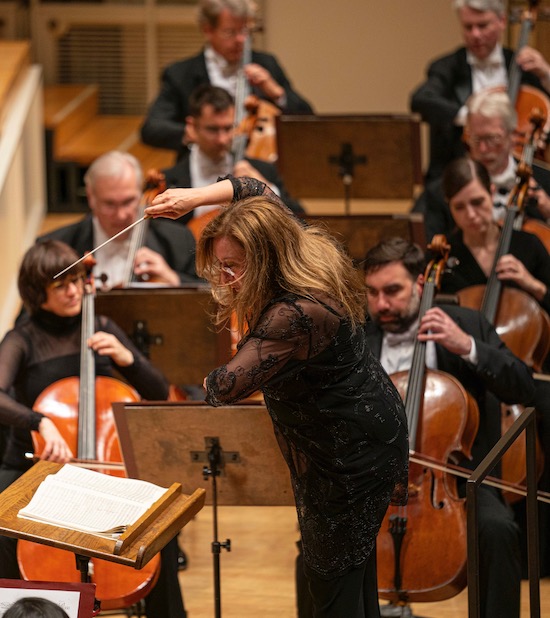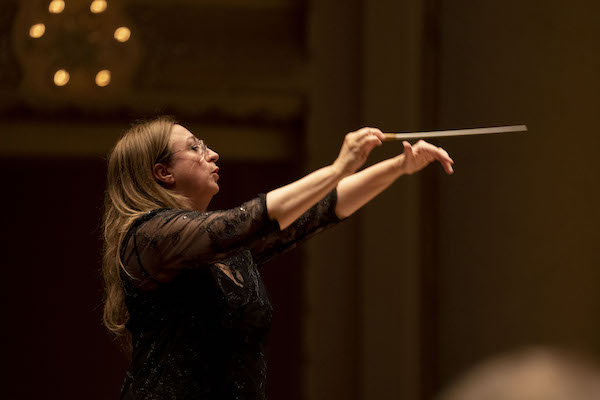Simone Young makes an exuberant debut with Chicago Symphony

Simone Young was to have made her Chicago debut two years ago at the Grant Park Music Festival. But the Australian conductor had to depart for Sydney shortly after arriving in town due to a family medical emergency.
Happily, Young was on the podium Thursday night as scheduled, making an impressive local bow leading the Chicago Symphony Orchestra.
Young has a taste for late German Romanticism as well as some less-traveled corners of the repertoire. She has recorded the complete Bruckner symphonies and conducted Wagner’s Ring cycle, as well as such operatic esoterica as Pfitzner’s Palestrina.
These adventurous qualities were reflected in her thoughtful program of less-traveled works by Liszt, Wagner and Brahms. Too bad so many CSO concertgoers stayed away, with scores of empty seats Thursday night, even with three familiar composer names on the program.
Orchestral excerpts from Wagner operas were once ineradicable concert-hall titanium. Changing tastes and, possibly, a more musicologically purist era have made such events relatively infrequent in the 21st century. Also, at a time when one can listen to a complete Ring cycle at home with a single click, there may be less of a practical rationale to present orchestral “bleeding chunks” of Wagner operas sans voices.
Yet Wagner’s music is so magnificent that a case can always be made for presenting excerpts in the concert hall, especially with a top orchestra capable of doing the music justice. Certainly such was the case Thursday night with Young leading excerpts from Götterdämmerung, the final opera of Wagner’s tetralogy.
Young was the first woman to conduct the complete Ring in the opera house, and she clearly has a firm handle on the majestic gloom that dominates this final opera depicting the demise of Siegfried and the downfall of the gods.
Young drew notably hushed playing in music depicting the dawn in the Prologue to Act 3. In the ensuing Rhine Journey, Siegfried’s theme was rendered with quiet gravitas by the nine horns, the character’s youthful high spirits nicely etched by Daniel Gingrich’s nimble horn solos.
The four Wagner tubas added their baleful tone to Siegfried’s Funeral Music and the mounting climaxes were finely calibrated by the conductor–weighty and powerful without turning cacophonous.
This was Wagner direction of firm musical integrity with Young never treating this theatrical music as a mere sonic spectacular. Rather, reflecting her experience in the opera house, she eschewed volume and surface flash for a flowing, seamless dramatic arc, with each incident leading into the next. The playing was not immaculate with a few minor slips but the orchestra reaffirmed their Wagnerian bona fides—somewhat quiescent in the Muti era—in a gleaming and brilliant performance.
Less essential was the program’s opening item, Liszt’s Prometheus. The fifth of Liszt’s twelve symphonic poems is not the worst in the series, though that’s not saying a whole lot. Prometheus is cast, like most of these works, as a symphonic sonata form on a heroic model, likely a crypto-self portrait of the composer. (“Suffering and apotheosis!” was Liszt’s restrained description.)
Young couldn’t do much with the banal fugal section, but she held the episodic work together and led a strong and dramatic account, drawing out the cooling balm of the high wind phrases and downplaying Liszt’s unhealthy vulgarity. Give her credit for finding a rare 19th-century work to present in its belated CSO premiere.
Orchestrating a classic chamber work like Brahms’ Piano Quartet in G minor can seem analogous to voting in Illinois elections and drinking decaf coffee. What is the point?
Yet Arnold Schoenberg’s symphonic transcription of Brahms’ Op. 25 was a labor of love for a composer he revered and a chamber work he greatly admired. The quartet’s bounty of thematic riches practically cry out out for a larger canvas, and Schoenberg’s souped-up arrangement supplies it with huge panache.
Not only is this 1937 confection, a product of Schoenberg’s California years, a brilliant and audacious bit of transcription. It’s also a hell of a lot of fun—not least in the finale when Schoenberg adds a decidedly non-Brahmsian xylophone and tambourine to the whirling gypsy-flavored main theme.
The best performances of this work should make the music sound convincingly like a Fifth Symphony that Brahms cast into the fireplace. Young and the orchestra accomplished that in the opening movement, with rich, Brahmsian textures while also setting the stage for the grander and quirkier aspects to come.
At times rhythms needed to be more incisive. Also Young has a tendency to underplay key contrasts. In the Intermezzo, especially, her segueing from one section into the next failed to set up and differentiate varied themes and tempos in a clear-cut way.
But for the most part this was an engaging, often exhilarating performance that got better as it continued. The ripely romantic opening of the Andante was irresistible in its yearning warmth and resplendence while the middle march-like section went with great swagger and antic grandiosity. Young also deftly underlined Schoenberg’s artful, often subtle wind scoring throughout.
If the conductor’s stage demeanor seemed formal and business-like early in the evening, she become more animated as the Brahms unfolded. In the Rondo alla zingarese finale, Young cut an engagingly Terpsichorean figure to match the exuberance of the music, while also bringing out the strains of klezmer and Viennese gemutlichkeit. Young was a dervish in the final section, cueing and directing the music as the large orchestra with its four percussionists led the frantic race to the coda.
The program will be repeated 1:30 p.m. Friday, 8 p.m. Saturday and 7:30 p.m. Tuesday. cso.org; 312-294-3000.
Posted in Performances




Posted Jun 08, 2019 at 10:12 am by Mary G.
The Schoenberg orchestration not pointless by any means! It was a new piece and I loved the final movement the same as played as piano quartet. I was thinking it sounds like Native American pow-wow. Gypsy, Klezmer, dervish-opportunity for conductor, all good words.